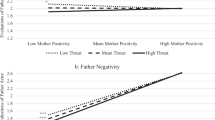Abstract
This study examines the evaluative behavior of parents toward their young children as a function of child gender. It also examines relations between parental evaluative comments and children's emotional behavior, specifically the expressions of shame and pride. Thirty intact, middle-class, Caucasian families and their 3-year-old children participated in the study. Dyadic interactions between each parent and child were videotaped across problem-solving situations. Transcripts were coded into categories of parent evaluative behavior and children's emotions were scored. Findings indicated that parents used more specific and positive, rather than global or negative evaluations. Moreover, boys received more positive evaluations while girls received more negative ones. Although children's expression of pride was not related to parental evaluative behavior, their expression of shame was related. Gender differences in parental evaluation were observed that may explain the gender differences in self-evaluation of the children themselves.
Similar content being viewed by others
References
Abramson, L., Seligman, M., & Teasdale, J. (1978). Learned helplessness in humans: Critique and reformulation. Journal of Abnormal Psychology, 87, 49–74.
Brophy, J. E., & Good, T. (1974). Teacher-student relationships: Causes and consequences. New York: Holt, Rinehart, & Winston.
Crandall, V. C. (1969). Sex differences in expectancy of intellectual and academic reinforcement. In C. P. Smith (Ed.), Achievement-related motives in children (pp. 99–125). New York: Russell Sage Foundation.
Deaux, K., & Emswiller, T. (1974). Explanations of successful performance on sex-linked tasks: What is skill for the male is luck for the female. Journal of Personality and Social Psychology, 29, 80–85.
Dweck, C. S., & Reppucci, N. D. (1973). Learned helplessness and reinforcement responsibility in children. Journal of Personality and Social Psychology, 25, 109–116.
Dweck, C. S., & Gillard, D. (1975). Expectancy statements as determinants of reaction to failure: Sex Differences in persistence and expectancy change. Journal of Personality and Social Psychology, 25, 109–116.
Dweck, C. S., & Leggett, E. L. (1988). A social-cognitive approach to motivation and personality. Psychological Review, 25, 256–273.
Dweck, C. S., Davidson, W., Nelson, S., & Enna, B. (1978). Sex differences in learned helplessness; II. The contingencies of evaluative feedback in the classroom, and III. An experimental analysis. Developmental Psychology, 14, 268–276.
Eccles, J. S., & Blumefeld, P. (1985). Classroom experiences and student gender: Are there differences and do they matter? In L. C. Wilkinson & C. B. Marrett (Eds.), Gender influences in the classroom. New York: Academic Press.
Etaugh, C., & Brown, B. (1975). Perceiving the causes of success and failure of male and female performers. Developmental Psychology, 11, 103.
Feather, N. T., & Simon, J. G. (1973). Fear of success and causal attributions for outcome. Journal of Personality, 41, 515–542.
Geppert, U. (1986). A coding system for analyzing behavioral expressions of self-evaluative emotions. Munich: Max Planck Institute for Psychological Research.
Heller, K. A., & Parsons, J. E. (1981). Sex differences in teachers' evaluative feedback and students' expectancies for success in mathematics. Child Development, 52, 1015–1019.
Hollingshead, A. B. (1975). Four factor index of social status. [Unpublished manuscript, Yale University (available from Department of Sociology).]
Huston, A. (1983). Sex-typing. In P. H. Mussen (Ed.), Handbook of child psychology, Vol. IV, Socialization, personality, and social development. New York: Wiley.
Lewis, M. (1992). Shame, the exposed self. New York: Free Press.
Lewis, M., & Feinman, S. (1991). Influence lost, influence regained. In M. Lewis & S. Feinman (Eds.), Social influences and socialization in infancy. New York: Plenum.
Lewis, M., Alessandri, S., & Sullivan, M. W. (1992). Differences in shame and pride as a function of children's gender and task difficulty. Child Development, 63, 630–638.
Lewis, M., Sullivan, M. W., Stanger, C., & Weiss, M. (1989). Self-development and self-conscious emotions. Child Development, 60, 146–156.
Maccoby, E. E., & Jacklin, C. N. (1974). The psychology of sex differences. Stanford, CA: Stanford University Press.
Nicholls, J. G (1975). Causal attributions and other achievement-related cognitions: Effects of task outcome, attainment value, and sex. Journal of Personality and Social Psychology, 31, 379–389.
Parsons, J. E., Ruble, D. N., Hodges, K. L., & Small, A. W (1976). Cognitive-developmental factors in emerging sex differences in achievement-related expectancies. Journal of Social Issues, 32, 47–61.
Stein, A. H., & Bailey, M. M. (1973). The socialization of achievement orientation in females. Psychological Bulletin, 80, 345–366.
Weiner, B. (1974). Achievement motivation and attribution theory. Morristown, NJ: General Learning Press.
Weiner, B. (1986). An attributional theory of motivation and emotion. New York: Springer-Verlag.
Author information
Authors and Affiliations
Additional information
This paper was supported by a W. T. Grant Foundation grant to Michael Lewis and a NICHD No. 17205 grant to M. W. Sullivan. The authors would like to thank John Jaskir for assistance with data analysis.
Rights and permissions
About this article
Cite this article
Alessandri, S.M., Lewis, M. Parental evaluation and its relation to shame and pride in young children. Sex Roles 29, 335–343 (1993). https://doi.org/10.1007/BF00289427
Issue Date:
DOI: https://doi.org/10.1007/BF00289427




